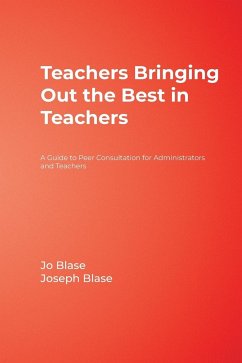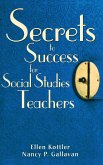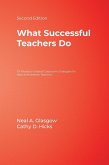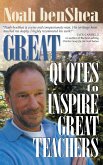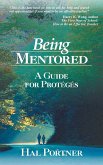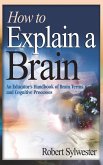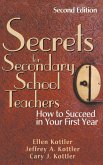Jo Blase, Joseph Blasé
Teachers Bringing Out the Best in Teachers
A Guide to Peer Consultation for Administrators and Teachers
Jo Blase, Joseph Blasé
Teachers Bringing Out the Best in Teachers
A Guide to Peer Consultation for Administrators and Teachers
- Gebundenes Buch
- Merkliste
- Auf die Merkliste
- Bewerten Bewerten
- Teilen
- Produkt teilen
- Produkterinnerung
- Produkterinnerung
Through nearly 300 research-based teacher perspectives on informal, teacher-to-teacher collaboration, school leaders will learn how teachers can promote professional growth in each other.
Andere Kunden interessierten sich auch für
![Secrets to Success for Social Studies Teachers Secrets to Success for Social Studies Teachers]() Ellen KottlerSecrets to Success for Social Studies Teachers78,99 €
Ellen KottlerSecrets to Success for Social Studies Teachers78,99 €![What Teachers Should Know But Textbooks Don't Show What Teachers Should Know But Textbooks Don't Show]() Stella ErbesWhat Teachers Should Know But Textbooks Don't Show55,99 €
Stella ErbesWhat Teachers Should Know But Textbooks Don't Show55,99 €![What Successful Teachers Do What Successful Teachers Do]() Neal A GlasgowWhat Successful Teachers Do84,99 €
Neal A GlasgowWhat Successful Teachers Do84,99 €![Great Quotes to Inspire Great Teachers Great Quotes to Inspire Great Teachers]() Noah BensheaGreat Quotes to Inspire Great Teachers70,99 €
Noah BensheaGreat Quotes to Inspire Great Teachers70,99 €![Being Mentored Being Mentored]() Hal PortnerBeing Mentored43,99 €
Hal PortnerBeing Mentored43,99 €![How to Explain a Brain How to Explain a Brain]() Robert SylwesterHow to Explain a Brain71,99 €
Robert SylwesterHow to Explain a Brain71,99 €![Secrets for Secondary School Teachers Secrets for Secondary School Teachers]() Ellen KottlerSecrets for Secondary School Teachers66,99 €
Ellen KottlerSecrets for Secondary School Teachers66,99 €-
-
-
Through nearly 300 research-based teacher perspectives on informal, teacher-to-teacher collaboration, school leaders will learn how teachers can promote professional growth in each other.
Produktdetails
- Produktdetails
- Verlag: Corwin
- Seitenzahl: 168
- Erscheinungstermin: 8. Juni 2006
- Englisch
- Abmessung: 260mm x 183mm x 14mm
- Gewicht: 523g
- ISBN-13: 9781412925952
- ISBN-10: 1412925959
- Artikelnr.: 22015127
- Herstellerkennzeichnung
- Libri GmbH
- Europaallee 1
- 36244 Bad Hersfeld
- gpsr@libri.de
- Verlag: Corwin
- Seitenzahl: 168
- Erscheinungstermin: 8. Juni 2006
- Englisch
- Abmessung: 260mm x 183mm x 14mm
- Gewicht: 523g
- ISBN-13: 9781412925952
- ISBN-10: 1412925959
- Artikelnr.: 22015127
- Herstellerkennzeichnung
- Libri GmbH
- Europaallee 1
- 36244 Bad Hersfeld
- gpsr@libri.de
Jo Blase is a professor of educational administration at the University of Georgia, and a former public school teacher, high school and middle school principal, and director of staff development. She received a Ph.D. in educational administration, curriculum, and supervision in 1983 from the University of Colorado at Boulder, and her research has focused on instructional and transformational leadership, school reform, staff development, and principal-teacher relationships. Through work with the Beginning Principal Study National Research Team, the Georgia League of Professional Schools, and public and private school educators with whom she consults throughout the United States and abroad, she has pursued her interest in preparation for and entry to educational and instructional leadership as it relates to supervisory discourse. Winner of the W. G. Walker 2000 Award for Excellence for her coauthored article published in the Journal of Educational Administration, the University of Georgia College of Education Teacher Educator Award, the University of Colorado School of Education Researcher/Teacher of the Year, and the American Association of School Administrators Outstanding Research Award, Blase has published in international handbooks and journals such as The Journal of Staff Development, The Journal of Curriculum and Supervision, Educational Administration Quarterly, and The Alberta Journal of Educational Research; her eight book editions include Empowering Teachers (1994, 2000), Democratic Principals in Action (1995), The Fire Is Back (1997), Handbook of Instructional Leadership (1998, 2004), Breaking the Silence (2003), and Teachers Bringing Out the Best in Teachers (2006). Blase has authored chapters on becoming a principal, school renewal, supervision, and organizational development; her recent research examines the problem of teacher mistreatment. She has published over 90 academic articles, chapters, and books, and she also conducts research on supervisory discourse among physicians as medical educators and consults with physicians in US hospitals and medical centers.
Foreword by Edith Rusch
Acknowledgments
About the Authors
Preface
1. Teachers Helping Teachers: The Case for Peer Consultation
Introduction
How Teachers Learn to Teach
The First Source of Teacher Help: Principals as Instructional Supervisors
The Second Source of Teacher Help: Lead Teachers and the Move Away From
Top-Down Administrative Control
The Third Source of Teacher Help: Naturally-Occurring Informal Peer
Consultation
Our Study of Peer Consultation Among Teachers
A Portrait of Peer Consultation
Questions to Consider
Suggested Reading for Further Learning
2. Peer Consultation Skill #1: Building Healthy Relationships by
Communicating, Caring, and Developing Trust
Communication as the Key
Four Types of Peer Consultation
Peer Consultants' Communication Style
Peer Consultants' Caring
Peer Consultants' Building Trust
Summary
Activities for Teachers and Administrators
Suggested Reading for Further Learning
3. Peer Consultation Skill #2: Using the Five Guiding Principles for
Structuring Learning
Experiences
Teachers' Knowledge Base
The Educational Productivity Research and the School Effects Research
From Knowledge to the Development of a Professional Learning Community
Peer Consultants' Guiding Principles for Structuring Learning Experiences
Summary
Implications for Practice
Suggested Reading for Further Learning
4. Peer Consultation Skill #3: Planning and Organizing for Learning
Teachers' Professional Development
Meta-Themes of Planning
Getting Organized for Instruction
Elements of Lesson Planning
Teacher Tips
The Dark Side of Planning and Organizing for Learning
Summary
Reminders and Questions
Suggested Reading for Further Reading
5. Peer Consultation Skill #4: Showing and Sharing
Showing: Three Kinds of Lessons
The Power of Learning by Observing: A Special Form of Showing
Sharing: A Bounty from Colleagues
Summary
Implications for Practice and Questions
Suggested Reading for Further Learning
6. Peer Consultation Skill #5: Guiding for Classroom Management
Nine Guiding Principles of Classroom Management
Setting Up and Maintaining Classroom Routines
Summary
Questions for Discussion Among Faculty and Administrators
Suggested Reading for Further Learning
7. Unleashing the Hidden Potential of Peer Consultation
Introduction
Capitalizing on the Power of Peer Consultation
An Element of Academic Leadership Revealed
Teachers Teaching Teachers: Peer Consultants at Their Best
How Peer Consultation Supports the Development of a Professional Learning
Community
Semi-Formal Collaboration Among Teachers and Its Effects
Conclusion: The Challenge for Teachers, Administrators, and Professional
Learning
Coordinators to Unleash and Sustain Peer Consultation
Resource: Research Methods and Procedures
References
Index
Acknowledgments
About the Authors
Preface
1. Teachers Helping Teachers: The Case for Peer Consultation
Introduction
How Teachers Learn to Teach
The First Source of Teacher Help: Principals as Instructional Supervisors
The Second Source of Teacher Help: Lead Teachers and the Move Away From
Top-Down Administrative Control
The Third Source of Teacher Help: Naturally-Occurring Informal Peer
Consultation
Our Study of Peer Consultation Among Teachers
A Portrait of Peer Consultation
Questions to Consider
Suggested Reading for Further Learning
2. Peer Consultation Skill #1: Building Healthy Relationships by
Communicating, Caring, and Developing Trust
Communication as the Key
Four Types of Peer Consultation
Peer Consultants' Communication Style
Peer Consultants' Caring
Peer Consultants' Building Trust
Summary
Activities for Teachers and Administrators
Suggested Reading for Further Learning
3. Peer Consultation Skill #2: Using the Five Guiding Principles for
Structuring Learning
Experiences
Teachers' Knowledge Base
The Educational Productivity Research and the School Effects Research
From Knowledge to the Development of a Professional Learning Community
Peer Consultants' Guiding Principles for Structuring Learning Experiences
Summary
Implications for Practice
Suggested Reading for Further Learning
4. Peer Consultation Skill #3: Planning and Organizing for Learning
Teachers' Professional Development
Meta-Themes of Planning
Getting Organized for Instruction
Elements of Lesson Planning
Teacher Tips
The Dark Side of Planning and Organizing for Learning
Summary
Reminders and Questions
Suggested Reading for Further Reading
5. Peer Consultation Skill #4: Showing and Sharing
Showing: Three Kinds of Lessons
The Power of Learning by Observing: A Special Form of Showing
Sharing: A Bounty from Colleagues
Summary
Implications for Practice and Questions
Suggested Reading for Further Learning
6. Peer Consultation Skill #5: Guiding for Classroom Management
Nine Guiding Principles of Classroom Management
Setting Up and Maintaining Classroom Routines
Summary
Questions for Discussion Among Faculty and Administrators
Suggested Reading for Further Learning
7. Unleashing the Hidden Potential of Peer Consultation
Introduction
Capitalizing on the Power of Peer Consultation
An Element of Academic Leadership Revealed
Teachers Teaching Teachers: Peer Consultants at Their Best
How Peer Consultation Supports the Development of a Professional Learning
Community
Semi-Formal Collaboration Among Teachers and Its Effects
Conclusion: The Challenge for Teachers, Administrators, and Professional
Learning
Coordinators to Unleash and Sustain Peer Consultation
Resource: Research Methods and Procedures
References
Index
Foreword by Edith Rusch
Acknowledgments
About the Authors
Preface
1. Teachers Helping Teachers: The Case for Peer Consultation
Introduction
How Teachers Learn to Teach
The First Source of Teacher Help: Principals as Instructional Supervisors
The Second Source of Teacher Help: Lead Teachers and the Move Away From
Top-Down Administrative Control
The Third Source of Teacher Help: Naturally-Occurring Informal Peer
Consultation
Our Study of Peer Consultation Among Teachers
A Portrait of Peer Consultation
Questions to Consider
Suggested Reading for Further Learning
2. Peer Consultation Skill #1: Building Healthy Relationships by
Communicating, Caring, and Developing Trust
Communication as the Key
Four Types of Peer Consultation
Peer Consultants' Communication Style
Peer Consultants' Caring
Peer Consultants' Building Trust
Summary
Activities for Teachers and Administrators
Suggested Reading for Further Learning
3. Peer Consultation Skill #2: Using the Five Guiding Principles for
Structuring Learning
Experiences
Teachers' Knowledge Base
The Educational Productivity Research and the School Effects Research
From Knowledge to the Development of a Professional Learning Community
Peer Consultants' Guiding Principles for Structuring Learning Experiences
Summary
Implications for Practice
Suggested Reading for Further Learning
4. Peer Consultation Skill #3: Planning and Organizing for Learning
Teachers' Professional Development
Meta-Themes of Planning
Getting Organized for Instruction
Elements of Lesson Planning
Teacher Tips
The Dark Side of Planning and Organizing for Learning
Summary
Reminders and Questions
Suggested Reading for Further Reading
5. Peer Consultation Skill #4: Showing and Sharing
Showing: Three Kinds of Lessons
The Power of Learning by Observing: A Special Form of Showing
Sharing: A Bounty from Colleagues
Summary
Implications for Practice and Questions
Suggested Reading for Further Learning
6. Peer Consultation Skill #5: Guiding for Classroom Management
Nine Guiding Principles of Classroom Management
Setting Up and Maintaining Classroom Routines
Summary
Questions for Discussion Among Faculty and Administrators
Suggested Reading for Further Learning
7. Unleashing the Hidden Potential of Peer Consultation
Introduction
Capitalizing on the Power of Peer Consultation
An Element of Academic Leadership Revealed
Teachers Teaching Teachers: Peer Consultants at Their Best
How Peer Consultation Supports the Development of a Professional Learning
Community
Semi-Formal Collaboration Among Teachers and Its Effects
Conclusion: The Challenge for Teachers, Administrators, and Professional
Learning
Coordinators to Unleash and Sustain Peer Consultation
Resource: Research Methods and Procedures
References
Index
Acknowledgments
About the Authors
Preface
1. Teachers Helping Teachers: The Case for Peer Consultation
Introduction
How Teachers Learn to Teach
The First Source of Teacher Help: Principals as Instructional Supervisors
The Second Source of Teacher Help: Lead Teachers and the Move Away From
Top-Down Administrative Control
The Third Source of Teacher Help: Naturally-Occurring Informal Peer
Consultation
Our Study of Peer Consultation Among Teachers
A Portrait of Peer Consultation
Questions to Consider
Suggested Reading for Further Learning
2. Peer Consultation Skill #1: Building Healthy Relationships by
Communicating, Caring, and Developing Trust
Communication as the Key
Four Types of Peer Consultation
Peer Consultants' Communication Style
Peer Consultants' Caring
Peer Consultants' Building Trust
Summary
Activities for Teachers and Administrators
Suggested Reading for Further Learning
3. Peer Consultation Skill #2: Using the Five Guiding Principles for
Structuring Learning
Experiences
Teachers' Knowledge Base
The Educational Productivity Research and the School Effects Research
From Knowledge to the Development of a Professional Learning Community
Peer Consultants' Guiding Principles for Structuring Learning Experiences
Summary
Implications for Practice
Suggested Reading for Further Learning
4. Peer Consultation Skill #3: Planning and Organizing for Learning
Teachers' Professional Development
Meta-Themes of Planning
Getting Organized for Instruction
Elements of Lesson Planning
Teacher Tips
The Dark Side of Planning and Organizing for Learning
Summary
Reminders and Questions
Suggested Reading for Further Reading
5. Peer Consultation Skill #4: Showing and Sharing
Showing: Three Kinds of Lessons
The Power of Learning by Observing: A Special Form of Showing
Sharing: A Bounty from Colleagues
Summary
Implications for Practice and Questions
Suggested Reading for Further Learning
6. Peer Consultation Skill #5: Guiding for Classroom Management
Nine Guiding Principles of Classroom Management
Setting Up and Maintaining Classroom Routines
Summary
Questions for Discussion Among Faculty and Administrators
Suggested Reading for Further Learning
7. Unleashing the Hidden Potential of Peer Consultation
Introduction
Capitalizing on the Power of Peer Consultation
An Element of Academic Leadership Revealed
Teachers Teaching Teachers: Peer Consultants at Their Best
How Peer Consultation Supports the Development of a Professional Learning
Community
Semi-Formal Collaboration Among Teachers and Its Effects
Conclusion: The Challenge for Teachers, Administrators, and Professional
Learning
Coordinators to Unleash and Sustain Peer Consultation
Resource: Research Methods and Procedures
References
Index

